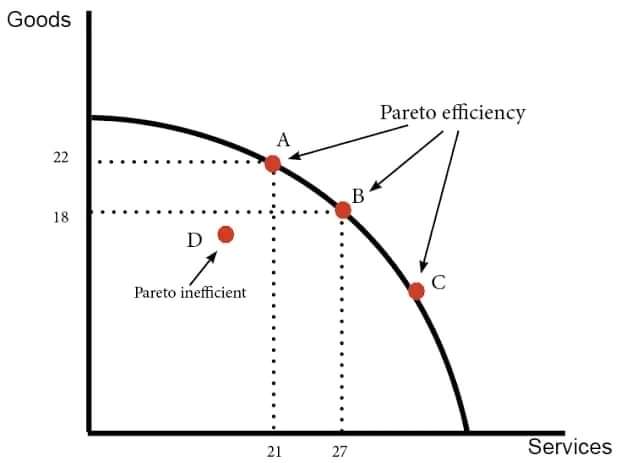It is a quality of allocations in economics and game theory. If an allocation is Pareto efficient, no option can be made better off without making at least one other option worse off.
It’s important to note that a Pareto efficient allocation, while always most efficient, is not necessarily the best or most fair. An allocation may be very unfair and very unequal while still being Pareto efficient.
There is typically more than one Pareto efficient allocation. The set of all Pareto efficient allocations is called the Pareto frontier, Pareto front or Pareto set.
✓ A change to an allocation that betters one individual without leaving anyone worse off is called a Pareto improvement. Once no more Pareto improvements can be made to an allocation, it is by definition Pareto efficient.
✓ Examples of Pareto Efficiency
Suppose you have two children, Donald and Mary, and they both run your two fruit and candy businesses. Mary prefers to spend most time in the fruit business, especially in the apple orchards; Donald prefers to run the candy business.
Now suppose you expanded the businesses; another type of apple and another type of candy bar. Mary would be happy if you would give her both; if the two expansions (apple, candy) make an ordered row, her ideal allocation would be (M, M). Her next preferred allocation would be (M, D); she’d have the new apples and Donald would have the new candy.

Donald, similarity, would love everything (D, D). If he had to give something up to his sister, he’d choose the apples; so his next preferred allocation would also be (M, D).
In this scenario (M, M) (D, D), and (M, D) are all pareto efficient allocations. Making either Mary or Donald happier in any of those scenarios would involve making the other one less happy.
(D, M) on the other hand, is an example of an an allocation that is Pareto inefficient. Having the two children trade products would be an easy way of making both of them happier at once.
It’s easy to see here that Pareto efficient does not equal fair. You can also see, however, that the fairest and Pareto efficient allocation are not in conflict, because an allocation that is not Pareto efficient can be made better for everyone involved by making a Pareto improvement. The fairest and best allocation can always be chosen from the Pareto set.

